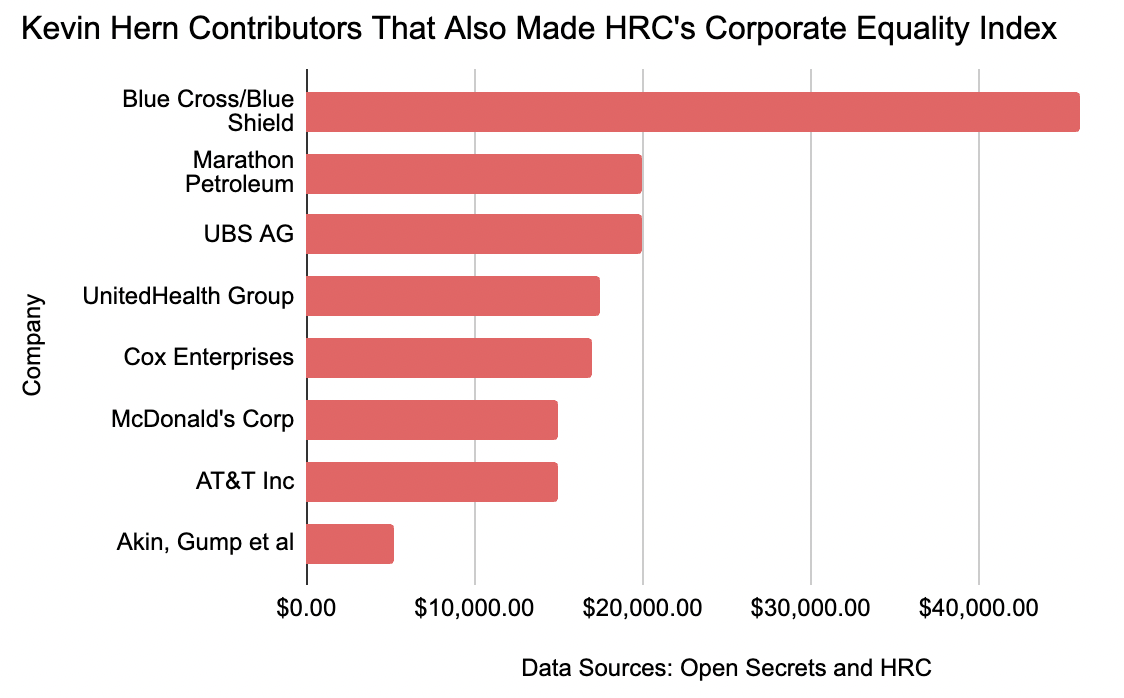These companies got perfect scores for LGBTQ+ workplaces. They’re also giving to an Oklahoma candidate aligned with anti-LGBTQ+ campaigns.
Kevin Hern, a Republican U.S. House Representative, has received over $155,000 from companies on HRC’s Corporate Equality Index.

This story is published in partnership with the Queer News Network, a collaboration among 11 LGBTQ+ newsrooms to cover down ballot elections across 10 states. Read more about us here.
The Human Rights Campaign’s Corporate Equality Index rates the most LGBTQ+-friendly companies every year on a scale of 0 to100. Among the top-rated this past year are Blue Cross Blue Shield, McDonalds and AT&T.
But a peek at campaign finance statements show that those same companies are donating thousands of dollars to a federal Republican lawmaker from Oklahoma who has championed anti-LGBTQ+ bills.
Kevin Hern, a Republican who represents Oklahoma’s first district in the U.S. House of Representatives, has received over $155,000 from companies on HRC’s 2023-2024 index, about 7% of his overall contributions.
Blue Cross Blue Shield, for example, donated $46,000 to Hern, according to Open Secrets. Blue Cross Blue Shield received a 100% rating by HRC, and was quick to tout their rating online.
“We are honored to once again have earned a perfect score on the Corporate Equality Index,” according to a press release on the Blue Cross Blue Shield of Minnesota's website.
In 2021, BCBS’s Association pledged to withhold contributions to members of Congress who voted to overturn the 2020 election results, which included Hern. This policy appears to have lapsed.
QNN reached out to BCBS for comment about the contradictions between their messaging on LGBTQ+ rights and their financial support for candidates. They did not respond.
In order to be listed on HRC’s Corporate Equality Index, companies are asked questions to gain a better sense of their commitment to LGBTQ+ employees' financial, physical and mental health. Companies that score well are listed on their website to help people looking for work, investors or consumers to better understand their values and policies.
In order to score 100 on the Corporate Equality Index employers must answer affirmatively to all LGBTQ+-related needs, which includes if the company “demonstrated public support for LGBTQ+ equality under the law through local, state or federal legislation or initiatives.”
Though HRC deducts points if a company is found to be “directing corporate charitable contributions to organizations whose primary mission includes advocacy against LGBTQ+ equality,” they do not subtract for contributing to legislators who actively advocate against the LGBTQ+ community.
Hern chairs the Republican Study Committee, the largest caucus of house Republicans. Rep. Marjorie Taylor Greene, of Georgia, is also a member of the caucus.
She and Hern both earned a zero on HRC’s 117th Congressional Scorecard which aims to make visible which legislators support LGBTQ+ legislation and to identify “anti-equality legislators” who target “the basic rights of LGBTQ+ people and other underserved communities.”
“The CEI only rates companies based on workplace policies and practices,” wrote Jared Todd, an HRC senior press secretary, in an email to QNN. In other words, companies who make HRC’s index can project an inclusive LGBTQ+ image but still donate to candidates scapegoating the LGBTQ+ community.
Hern, who the Heritage Foundation celebrated for voting their agenda 100% of the time, received campaign contributions this year from eight companies highlighted as best places to work by HRC.
According to Open Secrets, a site that aggregates candidate Federal Elections Commission data, BCBS, was the biggest contributor from the CEI.
Nicole McAfee, executive director of a two-spirited and LGBTQ+ advocacy group Freedom Oklahoma, said it’s not a surprise that companies with a big presence at local pride events are contributing to candidates like Hern, pointing to past battles in holding companies accountable. Two-spirited refers to a third gender — not masculine nor feminine — in Native American cultures.
“Businesses refused to engage in any way to try to disrupt anti-trans legislation,” McAfee said. “That really disrupted any notions that their choices were being driven by anything, but their own political interests.”
Organizations like McAfee’s are hoping HRC will start to leverage their power to pressure companies on the list to change their contribution criteria to match their workplace policies. They are in dialogue with HRC about their corporate relationships and asking for support when anti-LGBTQ+ legislation is proposed.
“There is certainly, within the movement, real conversation and engagement with HRC folks,” McAfee said.





